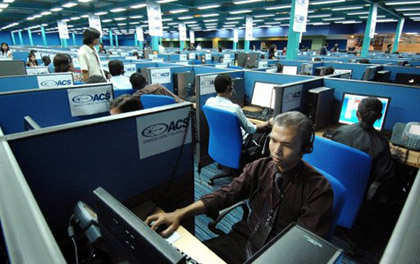SUMMARY
This is AI generated summarization, which may have errors. For context, always refer to the full article.

MANILA, Philippines – As the peso appreciates, the country is starting to lose its cost competitiveness in the IT-BPO industry.
A mid-December industry survey on the impact of the strengthening peso revealed that about 46.7% of business process outsourcing (BPO) executives said it has been difficult to hit revenue targets, while 40% said they have lost some business to other destinations or cancelled expansion plans (40%).
In a statement on Wednesday, December 26, Business Processing Association of the Philippines (BPAP) president and CEO Benedict Hernandez said the appreciation of the peso has made handicapped them as they combat challenges from top rival India.
Hernandez added that the cost difference between putting up a BPO firm in the Philippines and India has widened, to the chagrin of local players.
“The combination of an appreciating peso and a depreciating Indian rupee has provided India with a meaningful cost advantage,” the statement said.
The Philippine peso has strengthened by about 7% from about 43.90 to the US dollar on January 2. On Wednesday, December 26, the peso closed at P41.16 to the greenback.
The BPO industry earlier said keeping the peso at P42 to the dollar would be ideal to keep the industry competitive.
“With the 30% difference in peso and Indian rupee exchange rate with the US dollar, the cost differential has substantially widened. And that is much more difficult to manage,” Hernandez said, citing data from the Everest Group and Outsource2Philippines.
The Philippines overtook India as the world leader in call centers in revenue terms in 2009 and in manpower terms in 2010, according to industry figures.
The Philippines is also making strides in other outsourced businesses like medical and legal transcription, accounting, software writing and animation.
Earlier this year the association had forecast that call center revenues would rise to $8.4 billion this year with 493,000 people employed.
They said this should increase to $14.7 billion by 2016, when the sector is tipped to employ 862,000 people.
Hernandez did not say if the targets were now in danger of not being met.
Quality of service
“Quality of service and productivity continues to be at the core of our value proposition. But our industry must also be able to operate within acceptable market prices. That’s becoming increasingly difficult as the peso continues to appreciate,” he added.
Hernandez explained that while cost is an important factor for clients outsourcing work to the Philippines, the Philippine IT-BPO industry has traditionally competed for business on the basis of quality of service and productivity.
He said the Association of Southeast Asian Nations (ASEAN) has become a preferred destination for global portfolio investors as a result of sustained weakness in developed economies.
Investment inflows result in an increased demand for these currencies, including the Philippine peso, creating strong upward pressure on value.
Some economists expect a near-term correction on the value of the peso, citing the high price- to-earnings ratio (P/E ratio) of approximately 17, following months of record-setting gains on the Philippine Stock Exchange. – Rappler.com and Agence France-Presse
Add a comment
How does this make you feel?
There are no comments yet. Add your comment to start the conversation.